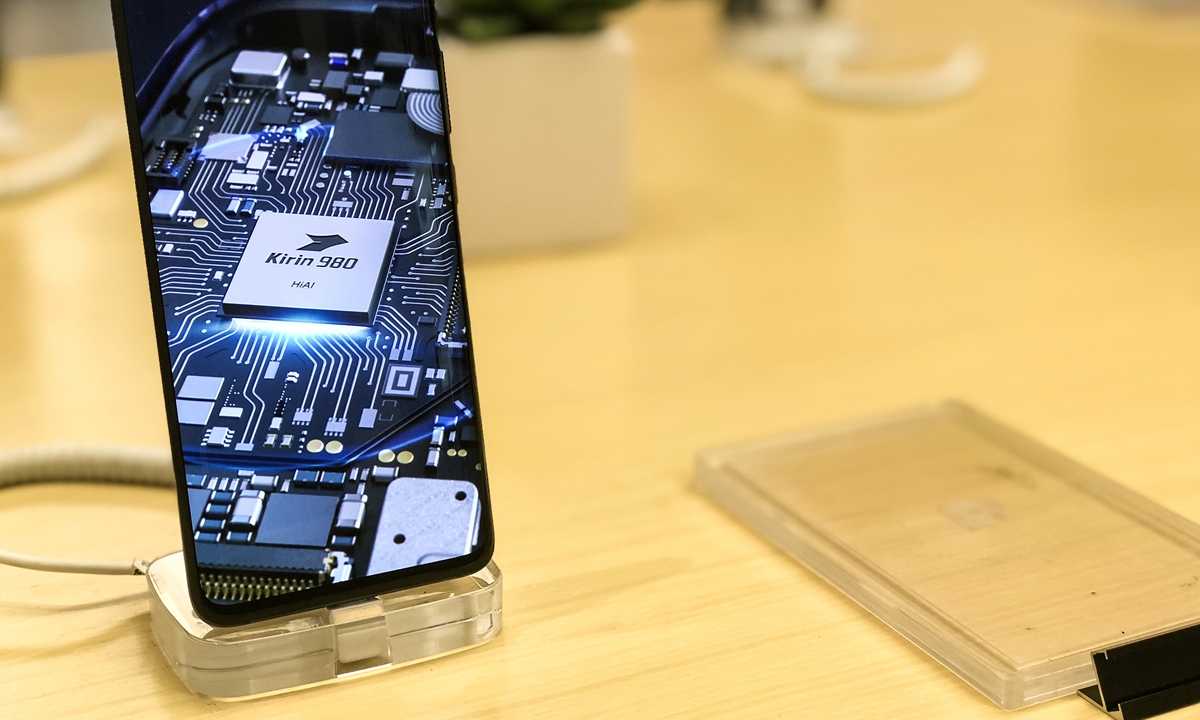Huawei to launch phone with Kirin 9000 chips in limited numbers
Source: Global Times Published: 2020/9/6 20:53:40

Huawei Kirin Photo:VCG
Huawei has a stockpile of about 10 million Kirin 9000 chips that will support shipments for about half a year, one telecom expert said, as the "deadline" for production of the Kirin 9000 is drawing near after the US government moved to block shipments of semiconductors to Huawei Technologies from global chipmakers.
Richard Yu Chengdong, chief executive of Huawei's consumer business group, disclosed recently that Huawei plans to launch its smartphone equipment with Kirin smartphone chips, but only in "limited numbers." He also confirmed that production of the chip will stop after September 15 due to US sanctions.
This has left the market guessing about the soon-to-be launched Mate 40 series, which is expected to be Huawei's last smartphone to carry Kirin chips. There have also been worries as to when Huawei will run out of Kirin 9000 chips and what solutions it will have.
Huang Haifeng, a veteran high-tech observer, said that based on his knowledge, Huawei's Kirin 9000 chip supplier, Taiwan-based TSMC, is working "day and night" to produce the chips for Huawei. The company earlier confirmed that it will stop shipping semiconductors to Huawei after mid-September to comply with the US sanctions.
"Huawei has about 10 million Kirin 9000 chips on hand, which means that about 10 million Mate40/Pro phones installed with the chip will be available, and I believe they will sell out very quickly," Huang told the Global Times on Sunday.
However, how Huawei's business, particularly high-end phones, will progress is uncertain after the US government cut its supplies as a way of cracking down on Chinese tech companies.
In 2019, the US government put Huawei on its Entity List, which requires US companies to obtain a license to export domestically produced chips and software to the company. Later, the Trump administration banned global chipmakers from shipping US technology-based semiconductors to Huawei Technologies.
"It's a lesson for Chinese companies that have only focused on design in the process of globalization. Now the only problem we face is production, as Huawei can't produce the chips by itself," Yu said, new.qq.com reported on Saturday.
Huang said it's highly probable that Huawei will be forced to halt selling its high-end mobile phones under the US ban, as it's not easy for it to find alternative suppliers that can mass produce high-end chips without US technologies.
According to Huang, taking a lesson from Huawei's challenges, the Chinese government should ramp up efforts to support domestic chip makers, rolling out favorable policies like tax cuts or even making hard rules such as telling domestic phone companies to use made-in-China chips in some of their products.
Xiang Ligang, an independent telecom analyst, said that the matter is not totally settled for Huawei.
"I wouldn't say that Huawei's high-end phone business is doomed, because the China-US political situation might change after the US presidential election," Xiang told the Global Times.
Xiang also noted that while Chinese chip manufacturers don't currently produce high-end 5- or 7-nanometer chips, it does not mean they won't be able to do so in the future.
"The reason they don't produce the high-end chips is mostly due to a lack of customers. Of course, they need to invest a lot of capital to upgrade their existing technologies, but it's not like a mission impossible for Chinese chipmakers," Xiang said.
Huang said that Huawei can shift its focus to other business areas, such as wearable devices and PCs, to increase cash flow. The company is also focusing on its budding cloud business, which still has access to US chips, to secure its survival, according to the Financial Times.
During the Huawei Developer Conference 2020, which will be held from Thursday to Saturday, the company is expected to make a major announcement that it will use its self-developed operating system HarmonyOS in its mobile phones, sources close to the matter told the Global Times.
It shows Huawei's awareness of the importance of reducing its reliance on foreign OS as well as foreign chipsets, after Washington imposed new restrictions on Huawei's supply chain.
Huawei's founder Ren Zhengfei also said recently that Huawei had transferred investment from the US to Russia, expanded the Russian scientist team, and increased the salaries of its Russian scientists, according to media reports.
Posted in: ECONOMY,BIZ FOCUS